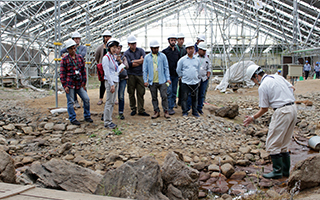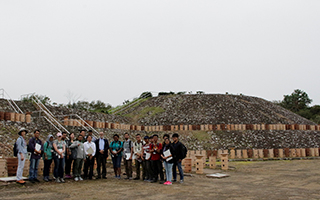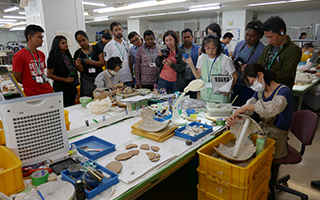Group Training Course for Young Professionals on Cultural Heritage Protection in the Asia-Pacific Region 2020
1. Organisers
This course is jointly organised by the Agency for Cultural Affairs, Japan (Bunkacho); Asia-Pacific Cultural Centre for UNESCO (ACCU); International Centre for the Study of the Preservation and Restoration of Cultural Property (ICCROM); and National Research Institute for Cultural Properties [Tokyo and Nara], in cooperation with Japan Consortium for International Cooperation in Cultural Heritage (JCIC-Heritage); under Japanese National Commission for UNESCO; Nara Prefectural Government; and Nara City Government.
2. Background
In the Asia and Pacific region there are various forms of cultural heritage which are of great value from a global point of view. In order to safeguard this important cultural heritage for future generations, it is necessary to train heritage professionals for proper investigation, analysis, and preservation. ACCU Nara, in partnership with ICCROM and Bunkacho has been organising training courses since 2000 on specific themes with a view to building the capacity of professionals involved with cultural heritage protection in the region. The curriculum of the 21st group training course is designed for young professionals and comprises comprehensive basic knowledge and techniques in the fields of investigation, preservation and management of archaeological sites.
3. Dates and Venue
Dates: 2 September (Wed) – 1 October (Thu) 2020
Venue: Online (self-paced learning)
4. Objectives
The objectives of the training course are to provide participants with:
- knowledge of the principles and methodologies for cultural heritage protection;
- knowledge of skills-based techniques for the documentation and analysis of archaeological sites;
- knowledge of skills-based techniques for the preservation and management of archaeological sites;
- opportunities to share their knowledge of heritage protection based on their professional experiences in the field and to build heritage protection networks in the region.
5. Training Curriculum
Units
- Current Issues and Global Perspective on Cultural Heritage Protection
- Cultural Heritage Protection System in Japan
- Research and Documentation of Archaeological Features
- Research and Documentation of Archaeological Artefacts
- Management and Utilisation of Archaeological Sites (Global perspective, The case of Japan)
Contents
Lectures [Curriculum]
- Case study on cultural heritage protection in the Asia-Pacific region
- Global trends in the preservation of archaeological sites
- Cultural heritage protection system in Japan
- Research methods of archaeological features
- Research methods of archaeological artefacts
and more.
6. Working Language
- English
7. Eligible Participants
Participants also should be:
- from the following 42 signatory countries to the UNESCO World Heritage Convention in the Asia-Pacific region. The maximum number of participants is 15 (one participant per nation, in principle).
Signatory countries:
Afghanistan, Australia, Bangladesh, Bhutan, Brunei Darussalam, Cambodia, China, Cook Islands, Fiji, India, Indonesia, Iran, Kazakhstan, Kiribati, Kyrgyz Republic, Lao P.D.R., Malaysia, Maldives, Marshall Islands, Micronesia, Mongolia, Myanmar, Nepal, New Zealand, Niue, Pakistan, Palau, Papua New Guinea, the Philippines, Republic of Korea, Samoa, Singapore, Solomon Islands, Sri Lanka, Tajikistan, Thailand, Timor-Leste, Tonga, Turkmenistan, Uzbekistan, Vanuatu and Viet Nam. - young heritage professionals who are expected to have 5-7 years’ working experience in the preservation of archaeological sites and to be able to make effective use of the training outcomes;
- those who are able to organise a digital learning environment; (For details please see the appendix)
- those who have a good command of English so that they can have lectures and write reports in English;
- those who are able to attend the entire programmes;
- those who are able to submit all required documents mentioned in item 8 by 1st July 2020;
- those who will continue to interact and exchange information with ACCU after the training course;
- those who have not participated in the ACCU group training course under the theme of ‘archaeology’.
8. Application Requirements
- Application form (Form 1) (Guideline)
Please attach a copy of the passport, if the applicant has a valid passport at the time of application. - Letter of recommendation from the institution of the applicant (Form 2)
- Short paper [2 pages] (Form 3) It will weigh heavily in the selection of participants.
This paper should be written by the applicant and describe:- reasons for applying;
- a brief summary of the applicant’s work related to the preservation of archaeological sites;
- future plans to utilise and develop the learning outcome in the applicant’s country.
- Certificate of English proficiency
This can serve as a reference for the screening. There is no need to attach this if applicants do not have one at present.
Application Deadline: 1 July 2020 (Wed)
Only complete applications with all necessary documents are eligible for consideration. It will be appreciated if the application sheet be sent in both Word and PDF formats.
The organiser will reply to the applicant who sends the documents above directly to us. In case s/he does not receive confirmation of receipt within a week, please contact us immediately.
9. Notification of Screening Results
After consideration in consultation with the co-organisers, the organiser will select 15 people from among the applicants. We will inform successful candidates of the result in late July.
10. Certificate
A certificate of completion will be awarded to participants who satisfactorily attend all course activities and make a final presentation.
11. Course Costs
Free
* Participants are required to prepare PC, internet, and any other necessary device for online learning by themselves.
12. Secretariat
Cultural Heritage Protection Cooperation Office,
Asia-Pacific Cultural Centre for UNESCO (ACCU Nara)
Nara Pref. Nara General Office,
757 Horen-cho, Nara 630-8113 JAPAN
Tel: +81-(0)742-20-5001 Fax: +81-(0)742-20-5701
E-mail: nara@accu.or.jp



